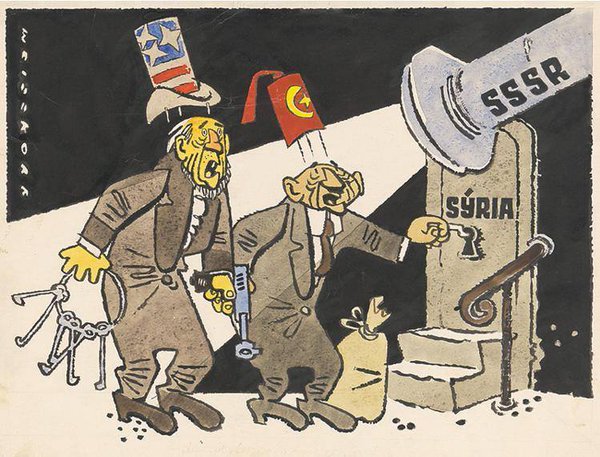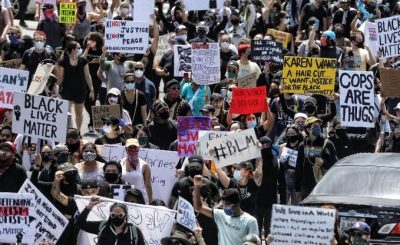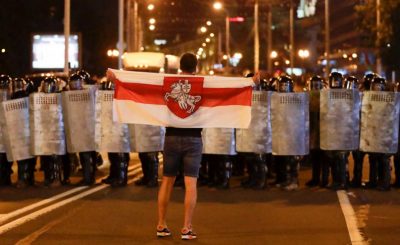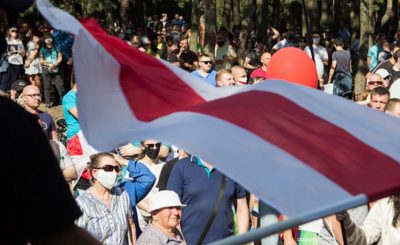Kurds, Turks, Arabs, Persians, all people in the Middle East! There is only one way to break the imperialist siege against the Middle East: the unity between the people and the fight against imperialism!
Fights between the KDP and the PUK… Interventions by Iran and Iraq… Imperialist attack…. Occupation attempts by the Turkish oligarchy… It’s still boiling in Northern Iraq… Who is going to win what? … Who is going to profit from this heated situation?… Who is going to loose something? The papers write that “all is newly arranged in Northern Iraq. In reality there is nothing new. On the side of the people there is nothing new. Only the developments of the last few months have shattered the military and political equilibrium. At first there were the fights between the KDP and the PUK. New balances of strength emerged every day. Thus the imperialist and the states in the region had to intervene directly in a military manner. At first Iran supported Talabani with troops. Then the Iraqi army intervened in the zone, forbidden to them by imperialism, on the side of Barzani. As everybody knows, imperialism then bombed Iraq. When we look at the present situation in Northern Iraq, Barzani has become stronger. But in the region everything has become more complicated. The question is who got stronger because of the growing strength of Barzani? This can not be answered easily. Has the KDP really become stronger? Or the regime of Saddam? Or imperialism? Or the Turkish oligarchy which plans to unite with Barzani? Numerous scenarios were developed in the press regarding the developments in Northern Iraq. From “the USA knew and accepted that Saddam was going to cross the forbidden line and was going to march to Erbil” to “Barzani planned all his manoeuvres together with the USA and the Turkish oligarchy”… Parts of these scenarios could contain a certain truth, but in fact they do not have much meaning for the Kurdish people and the people in the Middle East. Because in all the different scenarios, there is one part that never changes: the Kurdish people always looses, no matter who planned the events in Northern Iraq and who won. This is for us the most important. We do not have to analyse these events, which are mere games of the ruling classes, we have to initiate new developments. At present, the main problem is how it can be made certain that the Kurdish people and the people in the Middle East are no longer the losers.
Also the Kurdish leaders, who called and legitimated imperialism into Northern Iraq, are responsible for the attacks and the massacres.
There have been previous fights between Barzani and Talabani. But because of the status as a “Autonomous Kurdish Federation”, Barzani and Talabani became more dependent on imperialism. On the other side they became the official rulers of Northern Iraq, generating an income. Therefore the fights between both factions have an economical meaning as well. Imperialism alone created this status in Northern Iraq. When imperialism introduced this status after the attack against Iraq in 1991, some saw this as “imperialism wants to protect the Kurdish people for Saddam”. Some even thought that a state of their own, no matter how and in what form, was “progress”. Many, who called themselves Kurdish patriots, legitimised the presence of imperialism in the region for this reason. They allowed the force of the “hammer”, the US-military bases in Kurdistan. Neither Barzani, nor Talabani, nor the PKK, stood up against the establishment of imperialism in Northern Iraq during the time of the imperialist attack against Iraq, or at a later point. On the contrary, they agreed for several reasons. Not even the HEP-delegates in parliament rose their voices against the force of the “hammer” at that time. From the results we can now see how many birds were hit with one stone by imperialism: 1. Because of the support for the imperialist manoeuvres by many Kurds, the anti-imperialist consciousness of the Kurdish people was blurred. For imperialism, this was the main gain. 2. Imperialism further legitimised its policy of world-wide attacks and interventions. 3. It has split up the people in Iraq, thus hindering their revolutionary dynamics, splitting the forces which should fight together.
Now we ask: when imperialism would not have found collaborators in the region, who look at it as a “guardian”, could it have established itself so easily? When the Kurdish people in Iraq would have fought with the Iraqi people against imperialism when it attacked, when both people would, after the attack, have fought for their liberation together against the imperialists and Saddam, imperialism would not have entered the region as if it was “the home of his father”.
As long as the presence of the imperialism continues in Northern Iraq, the Kurdish people will continue to loose.
The USA attacked Iraq “to save Kuwait”, and to restore “world peace”. Under the pretext of “protecting the Kurdish people”, this situation was created in Northern Iraq. Also many people who consider themselves as left, revolutionary or patriots, fell for this lie. The last imperialist attack was legitimised with the fact that Saddam had crossed the 36. degree, thus attacking the Kurds. US-imperialism once again protected the Kurds, but this time only part of them – the “Kurdish leader” Talabani immediately welcomed the attack. But now something else has happened. In the statement, immediately after the attack, in the name of the American government, they stated that this was purely an attack in the US interests in oil. US-speaker Glyn Davies said they only wanted to protect the oil wells, which are in the south of the region. Those who still claim that the USA only wants peace in the region or just wants to protect the Kurdish people, must either be blind, or collaborating liars. The reasons for the presence and the attacks of imperialism become very clear and obvious at this point. All progressive, patriotic forces should re-examine their conduct and statements since 1991. The open justification for the imperialist attacks shows something else: As long as imperialism is present in the region, and its presence is found necessary and legitimised by the Kurdish leaders, there will be no liberation and independence for the Kurdish people, nor for the people in the Middle East. Because a free and independent country would be dangerous for the imperialists, for their oil and their oil-dollars. After this last attack, it has become quite obvious that when one trusts imperialism, independence can be achieved nowhere in the Middle East. Of course, there are countries in the world, like Iraq, Libya and Syria, which are formally independent. Everybody should ask himself why the Middle East is of so much importance to imperialism. Because the Middle East has 60% of the world-wide oil reserves (together with the oil in the Caucasus and Iran, this makes 80% of the world-wide oil resources). Would it really be possible that imperialism accepts an independent country in this region, existing without oppression and exploitation? Imperialism is more aggressive in the Middle East as any where else. It attacks freedom and independence of the people with more aggression. When we forget this for even one moment, we fall into the hands of imperialism. The freedom of the people in the Middle East can only be achieved by an offensive fight against imperialism. Those who try to make the people believe that there is another alternative, although the interests of imperialism are obvious, are against the liberation of the people.
The pillar of the World Order: inciting the people against each other, thus pushing through the imperialist interests.
Imperialism has for years armed many countries against “the Soviet and communist threat”. It thus promoted the war industry and it increased the dependency of the collaborators from the capitalist regimes, politically as well as economically. For a long time they have used the doctrine of the Cold War for this purpose. When the revisionist powers collapsed in the Soviet Union and in many other countries, imperialism lost it main justification for the sale of weapons. Imperialism needed a new doctrine for a new boost of its war industries. This boost is decisive for the whole of the economy. The New World Order, that’s the name of the present doctrine, the presently justification and the present policy. The New World Order was supposed to be two-legged. Firstly, the people and countries were to be incited against each other, based on nationalism. Secondly, imperialist interventions were to be legitimised in this chaotic situation, with the pretext of keeping the peace, supposedly forced by public opinion. Imperialism has used this policy since 1990. The attack by imperialism against Iraq and the interventions in Northern Iraq with the help from the mobile intervention forces, clearly show the application of this policy… This intervention, on the one hand sold to the public as a liberation of Kuwait from the occupation by Iraq, on the other hand as saving the Kurds from the oppression by Saddam, constitutes one of the largest and most important interventions by imperialism after the contra-revolutionary plot in the socialist countries. Those who do not see that these interventions occur to secure the rule of imperialism over the people in the world, legitimise themselves the presence of the imperialists in the Middle East. Everywhere where imperialism shows its presence end intervenes, this benefits the rulers. The revolutionary and nationalist forces, who didn’t understand the reason for the attack against Iraq and the presence of the imperialists yesterday, today work in vain at all kinds of scenarios, explaining the developments in Northern Iraq. The outcome must be clear to everybody: the destruction of the unity of the Kurdish people. The unity between the Kurdish people and the Arab and Persian people in Iran and Iraq has lost. The developments clearly show that short term calculations and short term political steps should be rejected.
THE SECURITY ZONE OF THE OLIGARCHY: AN ACT OF OCCUPATION
Turkey, depending from imperialism in every aspect, participated in the imperialist attack in 1991 to “give one and take five”. But imperialism doesn’t easily give away parts of its booty to its semi-colonies. The post-war period was also a time of a growing political and economical crisis. One of the causes was without doubt the continuing war in Kurdistan, or in other words the Kurdish problem. The oligarchy carried out new manoeuvres in Northern Iraq in the post war period and it entered new relations to solve its internal political problem. Pacts were made with Talabani, then with Barzani, or even with both. It used these pacts during the border-crossing manoeuvres against the PKK. Turkey has carried out border crossing manoeuvres since 1984. In some of them, more than 10.000 soldiers were involved. But these manoeuvres were from a politically and military view rather a product of desolation, and they only increased this feeling. Terror and more terror, that’s the desperate reaction against the desire for independence and freedom. Statements like “we have eradicated them”, “we have broken their backbone” were made so often that these actions no longer convince people, not even the rulers themselves. The security zone is the result of this development. More terror led in the beginning to more border crossing attacks, now this has become established policy. The intentions of Turkey to occupy Northern Iraq are totally in accordance with the plans of imperialism to limit the influence of Iran and to weaken Saddam. But when the project was to be realised, second thoughts emerged with the neighbouring countries and Russia. They didn’t view this action as the securing of a safety zone, or something like this, they saw it as an open occupation. The protesting countries fear a limitation of their area of activities. Their protests and objections are not about the suffering of the Kurdish people and the contempt of the borders of a country, they are only concerned about their own interests. Besides these concerns, maintaining the security zone brings a lot of problems in the view of the oligarchy. The oligarchy in fact intended to strengthen Barzani and it wanted to house Turkmenians in the area. But Barzani rather played poker with Saddam and didn’t show much enthusiasm for these plans. On the other hand the Turkmenians rather preferred Talabani, in stead of Barzani. But these are all rather secondary aspects, the situation could change any moment in this glibbery area. The real reason for the occupation is the attempt to weaken the hope of the Kurdish people and its struggle.
“What’s the situation of the liberation struggle in Kurdistan?”
The developments in the Kurdish area, in which numerous countries and political groups played their part and in which only Kurdish blood was spilled, leads to the question of the situation of the liberation struggle in Kurdistan. How shall the liberation be achieved? By the collapse of Iraq? The collapse of Turkey, or even Syria? And of course the question: “how will the collaborating, exploiting and oppressing governments collapse?” How was it possible that the historical tragedy of the Kurdish people, its internal feuds and the internal fights last this long? Why couldn’t the Kurdish people liberate itself from the benevolence of the neighbouring states? The main reasons are the relations and coalitions with the occupying countries which have different interests as the Kurdish people. Imagine, Iran supports Talabani and Iraq supports Barzani. How do they support them, and why? All factors which serve the liberation of the Kurdish people, basically harm the interests of these countries. Why do they nevertheless support them? They support them because their support does not serve the liberation of the Kurdish people, on the contrary, it makes them even more dependent. They support them because there are organisations which betray their own people, which fight against other Kurdish organisations and who pay the price for this support as well. When there wouldn’t be forces like these, who enter such pragmatic agreements, who literally invite imperialism, imperialism, nor the neighbouring states would, without doubt, not be able to act so easily. Another question: who is Barzani, and who is Talabani? For whom, and in whose name do they work? Who do they see as their friends, who as enemies? What’s their position in the national struggle for liberation? Without examining their previous relations and coalitions, one can not explain the present events in Northern Iraq, nor answer the question about the situation of the struggle for the liberation of Kurdistan.
Does the fate of a people depend from the contradictions between the imperialists or the contradictions within the ruling class?
The Kurdish forces in Northern Iraq – Talabani, Barzani and at certain times also the PKK – based their policy until now mainly on the contradictions between the imperialists, between the imperialists and the states in the region, and between the states in the region. The balance between these forces was also based on these contradictions. This political line has strengthened them for a short while, but they were weakened again because of the effects of this policy. In the discussions about this theme one can frequently hear: did not Lenin, Stalin and Mao themselves use the contradictions between the imperialists? Yes, that true. They used the contradictions, but they never made their political line second to these contradictions. “Using the contradictions” has nothing to do with “adjusting the line to the contradictions”. When the imperialists and the collaborating powers can push through demands from the forces which want to use their contradictions, these forces have become dependent. And this is what’s happening in Northern Iraq. The war between Iran and Iraq and the situation after it are an example of how much one can trust these contradictions: Iran supported the Kurds in Iraq during the war, it armed them and used them against Saddam. After the war Iraq and Iran marched jointly against the Kurdish people. The reward for the “support” by Iran has been Halpaca. In Halpaca and other places in Northern Iraq, thousands of Kurds were slaughtered. There are contradictions between Turkey, Iran, Iraq, Syria and Russia, but as soon as certain developments disturb their order, they will unite against them. A Kurdish state would be a development against which they could unify most easily. Our people have a saying which fits quite well: “One dog doesn’t bite the other”.
The freedom of the Kurdish people can only be achieved through a joint struggle of the Turkish, the Arab and the Persian people.
For imperialism and the states in the region, the nationalist line in the liberation of the Kurdish people constitutes the “lesser evil”, compared to the revolutionary line. That’s why they sometimes legitimise and support this line. This explains the contacts of a state which bans the use of the word “Kurd” on his won territory – Turkey -, with parties which have named themselves after Kurdistan – the KDP and the PUK. This also explains why imperialism, which wants to disarm and liquidate national liberation movements world-wide, not only doesn’t attack Barzani and Talabani, they even grant them a state of their own. The imperialist and the states in the region know that a revolutionary line in the liberation struggle of the Kurdish people would change the balance in the Middle East to the benefit of the people. This would be a severe blow to them. Imperialism wants to push through its own nationalism world-wide. A nationalism which is not aimed against them, but against the joint struggle of the people. The revolutionary line will achieve the liberation of the Kurdish people, together with the people in countries where the Kurdish people live. A Kurdish national organisation which does not work together with the people of the countries in which it is active, weakens itself from the outset. As long as there is no common struggle of the Kurds in Iraq, together with the Iraqi people, of the Kurds in Turkey with the Turkish people, and the Kurds in Iran with the people in Iran, the ruling classes of these countries will be able to contain the liberation struggle, military as well as politically. This stems from the experiences and developments of the liberation struggle, based on a nationalist line, in all parts of Kurdistan, waged without the people of the concerned states. The Kurdish people and its fighters should learn from the thousands, the tens of thousands, of people who fell.
The revolution against imperialism and the oligarchy will achieve the liberation of the Kurdish people.
The experiences from the past clearly show: without the fight against imperialism and the collaborating states, liberation can not be achieved. Barzani and Talabani in Northern Iraq are examples for this: Barzani makes a deal with Saddam. What’s the guarantee that there will be no new Halapcas tomorrow? Talabani calls the USA to help him, threatening he will otherwise “look for protection in Iran”. From bad to worse. What can the Kurds possibly achieve with such a policy? It does not lead to freedom, it leads from one collaboration to the other. Although the states in the region have their disagreements with imperialism, in the end they are exploiters and oppressors as well. They are more or less dependent from the imperialists, or they could become dependent at any moment. That’s why it is a mistake to rely on these states. To achieve liberation, the Kurdish people have to fight imperialism and the collaborating regimes which occupy Kurdistan, together with the people of these countries. The revolution against imperialism and the oligarchy will enable another kind of independence for the Kurdish people. Today, Turkey and Iraq are so-called independent states, but they exploit their people and the slaughter them. With such an independence, the exploitation will not end. The only thing that will change, will be the flag. The Kurdish people will then be exploited under a Kurdish flag. When we have to pay such a high price for liberation, when thousands of our children died for it, and will die in the future, then this liberation should be a national, as well as a social liberation. The people should be liberated from all kinds of exploitation and oppression. The revolution against imperialism and the oligarchy will also be the road to a true independence of the Kurdish people.




